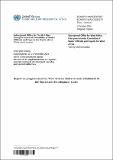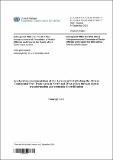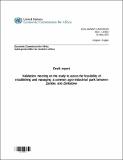Our Institutional Repository is currently undergoing an upgrade. The platform remains accessible for search and consultation. However, user login and content submissions are temporarily disabled. We appreciate your understanding.
Support from the Economic Commission for Africa for increasing tax revenues in the Sudan
| dc.description.abstract | Tax revenue mobilization remains a significant macroeconomic and development challenge for the Sudan. A sustained and consistent increase in revenue will not only lead to direct fiscal benefits but can also contribute to economic and social stability. Empirical evidence shows that tax revenue contributes to economic growth when the revenue is greater than 12.75 per cent of GDP. Countries collecting less than 15 per cent of GDP in taxes must increase their revenue collection to meet the basic needs of their citizens. This level of taxation is important to make the State viable. Tax collection is low in the Sudan. Tax revenue stood at about 1 per cent of GDP in 2020, down from 6 per cent in 2019 and 5 per cent in 2018. The tax-to-GDP ratio in the Sudan is lower than that of countries with similar characteristics and per capita GDP. To assist the Sudan in addressing its fiscal deficit challenge, ECA began providing technical assistance to support the Taxation Chamber of the Sudan in 2021. The assistance was mainly focused on enhancing the performance of the Chamber’s Large Taxpayers’ Office. In collaboration with the Egyptian Tax Authority, ECA worked hand in hand with the Chamber to improve tax assessment and compliance rates and to modernize tax administration, with a view to increasing tax revenues. The project was also aimed at improving the skills of the tax auditors through training and exchanges of experience with the Egyptian Tax Authority. Efforts by ECA to support the Taxation Chamber of the Sudan in its reform of the tax system are summarized in the present report, highlighting challenges facing the tax authority, actions taken to enhance tax procedures and the results achieved. | en |
| dc.title | Support from the Economic Commission for Africa for increasing tax revenues in the Sudan | en |
| uneca.subject.fulltaxonomy | UNBIS::ECONOMIC DEVELOPMENT AND DEVELOPMENT FINANCE::DEVELOPMENT | en |
| uneca.subject.fulltaxonomy | UNBIS::ECONOMIC DEVELOPMENT AND DEVELOPMENT FINANCE::TAXATION::TAX COLLECTION | en |
| uneca.subject.fulltaxonomy | UNBIS::ECONOMIC DEVELOPMENT AND DEVELOPMENT FINANCE::TAXATION::TAX REVENUES | en |
| uneca.subject.fulltaxonomy | UNBIS::ECONOMIC DEVELOPMENT AND DEVELOPMENT FINANCE::TAXATION::TAX SYSTEMS | en |
| uneca.subject.fulltaxonomy | UNBIS::ECONOMIC DEVELOPMENT AND DEVELOPMENT FINANCE::TAXATION | en |
| uneca.subject.fulltaxonomy | UNBIS::GEOGRAPHICAL DESCRIPTORS::AFRICA::SUDAN | en |
| uneca.subject.fulltaxonomy | UNBIS::GEOGRAPHICAL DESCRIPTORS::AFRICA::SUDAN | en |
| uneca.creatorCorporate.fulltaxonomy | Corporate Authors::United Nations. Economic Commission for Africa | en |
| ags.creatorCorporate | United Nations. Economic Commission for Africa. Sub Regional Office for North Africa (SRO-NA) | en |
| ags.subjectThesaurus | DEVELOPMENT | en |
| ags.subjectThesaurus | TAX COLLECTION | en |
| ags.subjectThesaurus | TAX REVENUES | en |
| ags.subjectThesaurus | TAX SYSTEMS | en |
| ags.subjectThesaurus | TAXATION | en |
| ags.subjectThesaurus | SUDAN | en |
| ags.subjectThesaurus | SUDAN | en |
| ags.publisherPlace | Addis Ababa: | en |
| ags.publisherName | UN. ECA, | en |
| dc.date.accessioned | 2025-01-28T07:50:07Z | |
| dc.date.available | 2025-01-28T07:50:07Z | |
| dc.date.issued | 2025-01 | |
| dc.identifier.uri | https://hdl.handle.net/10855/50303 | |
| dc.format.extent | vi, 25 p.:ill | |
| dc.language | eng | |
| dc.type | Working paper | |
| uneca.workflow.processed | true | |
| ags.subjectThesaurus | DEVELOPMENT | |
| ags.subjectThesaurus | TAX COLLECTION | |
| ags.subjectThesaurus | TAX REVENUES | |
| ags.subjectThesaurus | TAX SYSTEMS | |
| ags.subjectThesaurus | TAXATION | |
| ags.subjectThesaurus | SUDAN | |
| ags.subjectClassification | 02.06.02 TAXATION | |
| ags.availabilityNumber | 2025 | |
| ags.availabilityNumber | b970002 | |
| ags.availabilityLocation | ECA-HQ | |
| ags.rights.termsofuse | public | |
| ags.JN | b970002 | |
| uneca.language.supported | en |




